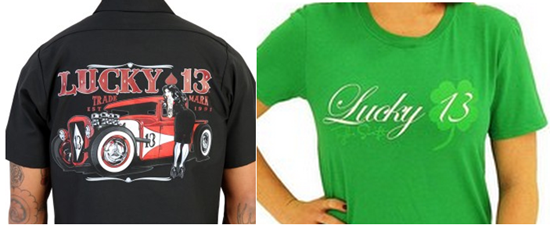“I was born on the 13th. I turned 13 on Friday the 13th. My first album went gold in 13 weeks. My first #1 song had a 13-second intro”
“Every time I’ve won an award I’ve been seated in either the 13th seat, the 13th row, the 13th section or row M, which is the 13th letter”
Okay fine, we see why 13 might have some importance and, further, why Taylor would feel compelled to try and make a brand out of it. It’s her story, after all, and at least one characteristic of a trademark is that they are associated with some kind of a story in the mind of a consumer (you might call this story “goodwill”). To Taylor, she has used the number 13 so many times that it has acquired secondary meaning.
In my mind, “Lucky 13” seems to be just a bit too common. After all, it’s a classic case of a paradox. “13” has long been suspected as a mark of bad luck, so combining “Lucky” tends to challenge people’s psyche just a bit. Perhaps for that reason, it could make a potentially good trademark. The problem is that at least a few other people have adopted “Lucky 13” as a trademark. Unfortunately, it just so happens that Taylor’s chosen category of goods (clothing) has one of these trademarks.
Having a lot of other similar trademarks on the market seems to make it harder for a person to acquire the kind of secondary meaning that it would take to win claim superiority to use a particular mark. It could also mean that LUCKY 13 really isn’t that strong of a trademark because the phrase is so widely used and understood. In that sense, it is almost as an idiom.
Maybe Taylor is banking on the defense that “Lucky 13” is so common that it is difficult for Blue Sphere to claim exclusivity of ownership for this particular trademark. This is a real stinker of an argument, though, because Blue Sphere does appear to have the secondary meaning that is necessary to show that its registration has some “umpf” to it. Over 20 years of exclusive use (on apparel items) has to be worth something and so do the sales that Blue Sphere made. All of that goes into the hopper for Blue Sphere to show that when consumers see “LUCKY 13” plastered on the front of a shirt, they think of Blue Sphere, not Taylor Swift. Checkmate to Swift’s potential argument that “Lucky 13” is generic for any type of goods.
If Taylor’s lawyers believed that the mark LUCKY 13 was in danger of being challenged for being generic, that might be why they didn’t bother applying for a trademark. But wouldn’t they have been the least bit concerned about a potential trademark infringement suit once they looked at Blue Sphere’s registrations? That would have been something that caught my attention. Searching the trademark database for any kind of trademarks is usually step one in any kind of marketing or branding campaign, at least where an ostensible goal of the campaign is to try and develop some kind of a phrase that can be assigned to the underlying source.
If you are going to use a trademark even remotely similar to an existing trademark, you should probably have your reasons. And those reasons should be compelling, as in there is a strong possibility that the existing trademark has issues or your use of something similar doesn’t even come close to impinging on the registered trademark. I’m guessing here that if Taylor was smart enough to realize the benefits of registering 45 different trademarks (just for her name), I’m sure her lawyers would have been careful enough to conduct a search on a particular trademark before committing to printing thousands of shirts (which I advise you to do, too, in case you were interested in doing the same thing).
Or maybe Taylor really is feeling lucky.



 RSS Feed
RSS Feed